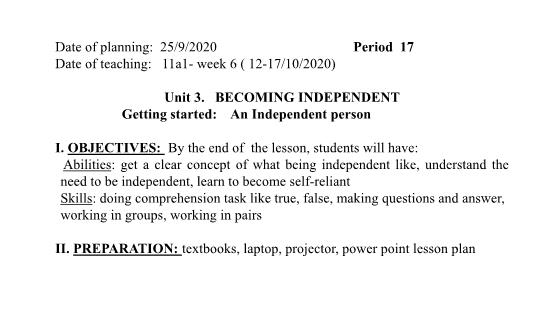Giáo án Tiếng Anh Lớp 11 - Tiết 17 đến 24, Unit 3: Ecoming independent - Bùi Thị Mỹ An
Unit 3. BECOMING INDEPENDENT
Getting started: An Independent person
I. OBJECTIVES: By the end of the lesson, students will have:
Abilities: get a clear concept of what being independent like, understand the
need to be independent, learn to become self-reliant
Skills: doing comprehension task like true, false, making questions and answer,
working in groups, working in pairs
II. PREPARATION: textbooks, laptop, projector, power point lesson plan
Bạn đang xem 20 trang mẫu của tài liệu "Giáo án Tiếng Anh Lớp 11 - Tiết 17 đến 24, Unit 3: Ecoming independent - Bùi Thị Mỹ An", để tải tài liệu gốc về máy hãy click vào nút Download ở trên.
Tóm tắt nội dung tài liệu: Giáo án Tiếng Anh Lớp 11 - Tiết 17 đến 24, Unit 3: Ecoming independent - Bùi Thị Mỹ An

Date of planning: 25/9/2020 Period 17 Date of teaching: 11a1- week 6 ( 12-17/10/2020) Unit 3. BECOMING INDEPENDENT Getting started: An Independent person I. OBJECTIVES: By the end of the lesson, students will have: Abilities: get a clear concept of what being independent like, understand the need to be independent, learn to become self-reliant Skills: doing comprehension task like true, false, making questions and answer, working in groups, working in pairs II. PREPARATION: textbooks, laptop, projector, power point lesson plan . . 1. Why does Lan like Minh? . 2. Why does Lan think that Minh is a responsible person? . 3. What is an example showing that Minh is very determined? Last month, they were given a very hard math problem. While most of his classmates gave up, he . 4. Why does Lan think that Minh is self-reliant? . 5. What are the characteristics of an independent person according to Lan and Mai? 6. Find all the adjecti...allenging tasks. 8. “I’ll climb the highest mountain, no one can stop me”, he said very determined More excercises Underline the mistakes in the following sentences Find the structure: Subject + verb + Adjective / Noun + to infinitive Subject + verb + Adjective + to infinitive What is the purpose of “to infinitive” after the “adjective ”? - We can use the “to infinitive” after certain adjectives / nouns to give a reason for the adjectives. (glad, happy, lucky, amazed, surprised, proud, determined, pleased, sorry, disappointed, sad, afraid) Subject + Adjective / Noun + to infinitive What is the purpose of “to infinitive” after the “adjectives”? - We use the “to infinitive” in the structure: It + linking verbs + adjective to make comment (be, seem ) or judgement. (easy, difficult, hard, interesting, boring, nice, great, good, possible, impossible, likely, important, necessary, unreasonable) Subject + verb + Adjective / Noun + to infinitive What is the purpose of “to infinitive” after the “adjectives”? - We can also use the “to infinitive” after certain abstract nouns to give a reason for the adjectives. (advice, ability, ambition, anxiety, attempt, chance, decision, dream, failure, permission, plan, request, wish, way, demand, determination, effort, offer, willingness) What is the purpose of “to infinitive” after the “adjectives”? - We can use the “to infinitive” after certain adjectives (glad, happy, lucky, amazed, surprised, proud, determined, pleased, sorry, disappointed, sad, afraid) to give a reason for the adjectives. - We use the “to infinitive” in the structure: It + linking verbs + adjective to make comment (be, seem ) or judgement. (easy, difficult, hard, interesting, boring, nice, great, good, possible, impossible, likely, important, necessary, unreasonable) - We can also use the “to infinitive” after certain abstract nouns (advice, ability, ambition, anx...It’s possible for you to finish the project on your own. . 4. Rewrite the sentences, using the nouns in brackets and a to-infinitive (page 33) Example: She knows how to solve the problem (way). She knows the way to solve the problem. You are not ill so there is no need to stay in bed. My teacher has the ability to make complicated things easy to understand. His decision to take part in the contest surprised all of us. I couldn’t get permission to go to the party. I don’t know about their plan to go to NT . More exercises: 1. Combine the sentences using the to-infinitive 1. The students heard that the President would visit their school. They were excited. 2. Laura has been selected to represent her class at the May Festival. She is proud. 3. I’ll win the race. I’m determined. 4. Mike will volunteer to help at the special school for children with disabilities. He’s willing. 5. Don’t try to make him change his mind. It’s not easy. 6. You have to understand English culture to communicate with English people successfully. It’s necessary. 7. We all like to talk to him. It’s interesting. 8. Because of developments in medicine, a lot of people can live to 100. it’s quite possible. . More exercises: 2. Rewrite the sentences, using the nouns in brackets and a to-infinitive so that the new sentences have the closest meaning to the given ones. 1. She can cook for herself and that makes her more independent. (ability) 2. We were very impressed when we saw that she tried very hard to overcome difficulties. (effort) 3. Her teachers like her because she is always willing to learn. (willingness) 4. She has always wanted to visit the UK and that has made her work harder at her English language skills. (wish) 5. I agreed with him when he suggested that we should take part in more outdoor activities. (suggestion) 6. The headmaster refuse to allow us to go camping in the mountains. (permission) 7. She was ve
File đính kèm:
 giao_an_tieng_anh_lop_11_tiet_17_den_24_unit_3_ecoming_indep.pdf
giao_an_tieng_anh_lop_11_tiet_17_den_24_unit_3_ecoming_indep.pdf

